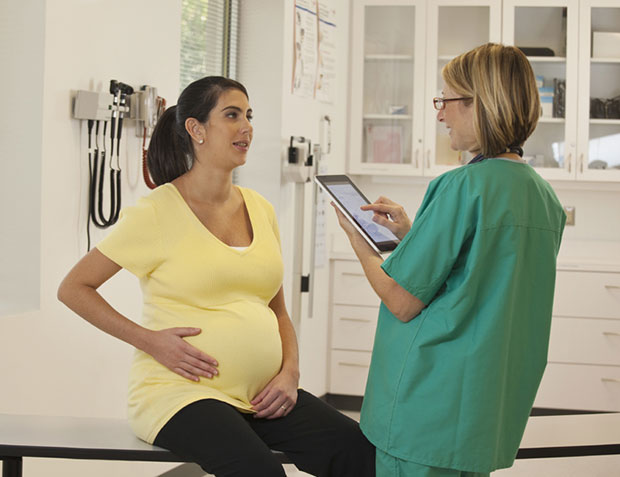Perinatal screening 2nd trimester of pregnancy. What week is the second screening done during pregnancy?
Hello, dear readers! Today we will talk about what, on the one hand, makes us, expectant mothers, literally experience butterflies in our stomachs in anticipation of the next meeting with the baby, and on the other hand, cannot find a place for ourselves from excitement. And once again dismiss the thought: “What if there’s something wrong with him?”
Have you guessed what I mean? Of course, about a new comprehensive examination, which now falls in the second trimester. And its name is second screening during pregnancy. The timing of its implementation, normative indicators and deviations from the norm - these are the main questions that interest most women. We'll talk about them.
Second screening, or 2nd trimester screening, is diagnostic test, the purpose of which is also to identify the risks of developing pathologies in the fetus.
Traditionally, it includes an advanced ultrasound and biochemical blood test. Interestingly, the latter is called triple in terms of the number of proteins and hormones studied.
What does it include? Level test:
- free estriol;
- alpha-fetoprotein.
All of them make it possible to assess the condition of the fetus and identify pathologies of the liver, intestines, kidneys, adrenal insufficiency, defects of the neural tube and spinal canal, ichthyosis and Smith-Lemli-Opitz syndrome, as well as detect gestosis and diabetes mellitus from the mother herself.
2. When and to whom is the second screening performed?
How long does it take? It's difficult to answer unambiguously. The fact is that some experts advise undergoing a second screening at 16–20 weeks, emphasizing that the results of the same biochemical test or blood test are considered as accurate as possible if the material for research was taken strictly from the 16th week to the 6th week. th day of the 18th week. Others insist that you can wait until 22 - 24 weeks.

So when is the second screening actually done? This is a completely natural question that only a doctor observing the pregnancy can answer. Simply because he alone sees the results of the previous screening, on the basis of which he decides when it is better to do screening in each individual case. Or advises to abandon it altogether. After all, such a study is not a mandatory procedure and is indicated only for women at risk. Can you guess who it is?
- women over 35;
- those who have had or are in danger of being interrupted or worse complications V previous pregnancies, miscarriages;
- those who have suffered acute bacterial or infectious diseases on early stages and, as a result, took medications contraindicated during pregnancy;
- those who have children with genetic diseases or family members with congenital malformations;
- those who were diagnosed with neoplasms in the 2nd trimester;
- those whose previous screening revealed big risks likelihood of developing defects.
Along with them, the expectant mother will most likely be invited to the second screening if the father of her child is her blood relative. Everyone else will only be given a referral for a second ultrasound for evaluation. general condition of the fetus, which is usually carried out at 22–24 weeks of pregnancy. Although if they also want to undergo another screening and once again make sure that there are no risks, they are unlikely to be refused.
3. How to prepare for the second screening
The good news at this time for the expectant mother will be that there is no need for thorough preparation for an extended ultrasound.
This means that drinking liters of water immediately before the procedure, filling bladder and holding back, but thereby providing the specialist with a kind of viewing window, is no longer necessary. Now this function is performed by amniotic fluid.
Unfortunately, this news does not apply to the biochemical test. There, as before, it is important special diet, thanks to which you can get the most accurate results.

What should be excluded? That's right, allergens and junk food, namely:
- cocoa;
- chocolate;
- citrus;
- seafood;
- excessively fatty;
- roast.
But the main thing here is not to get upset. You only need to wait a day before the biochemical test. On the day of the actual test, you must come to the laboratory on an empty stomach. How is the test done? Like a regular blood test from a vein.
4. Standard indicators for the second screening
What do you think a study like this shows? That’s right, the approximate weight of the fetus and the dynamics of its development.

Based on the results obtained, the specialist can judge:
- the structure of the fetus (does it have arms, legs, fingers, spine, etc.);
- condition internal organs(brain, heart, kidneys, stomach, liver, etc.);
- fetal parameters;
- condition of the placenta and cervix;
- quantity and quality of amniotic fluid;
- field of the future baby.
Upon completion, it issues a conclusion with the data obtained. By comparing them with the norms, we can talk about the health of the unborn baby. For your convenience, we have presented them in the form of a table:
|
|

